沪教版六年级英语上册-全套复习资料
(推荐下载)沪教版六年级英语上册-全套复习资料298

Unit 1 Family and relatives1. family and relatives 家庭和亲戚2. a family tree 一个家谱3. grandsons and granddaughters 孙子和孙女们/外孙和外孙女们4. get a lot of presents 得到许多礼物5. Happy Birthday (to sb.) ! 生日快乐!6. get a birthday card from sb. 从某人那儿得到一张生日卡7. one of my family members 我的家庭成员之一8. only have one aunt 仅仅有一个阿姨9. my classmates 我的同班同学10. go shopping 去购物11. what else 其他什么12. play badminton 打羽毛球13. go cycling 去骑自行车14. go swimming 去游泳15. two cousins 两个堂/表兄弟/妹16. how many + 名词复数多少……语言点1.介绍 This is....../These are......这是....../这些是...... This is my grandfather.这是我的(外)祖父。
These are my family and relatives.这些是我的家人和亲戚。
注意句中各成分保持单复数同形。
2. I‟m their son.. 我是他们的儿子。
We‟re their sons.我们是他们的儿子。
3. 询问信息Who is this?/Who are these?这是谁?/这些是谁?How old is......? ......几岁?A:How many......have you got?你有多少......?B:I have got ...... / I have only got one......我有. ...../我只有一个......A:What do you usually do with your......?你通常和你的......做......?B:I always/usually/sometimes/never do sth. with my......我总是/通常/有时候/从不和我的...做...How many uncles do you have?你有多少个叔叔? How many后面接可数名词的复数形式。
沪教版六年级英语(上册)_(全套)复习资料全(K12教育文档)
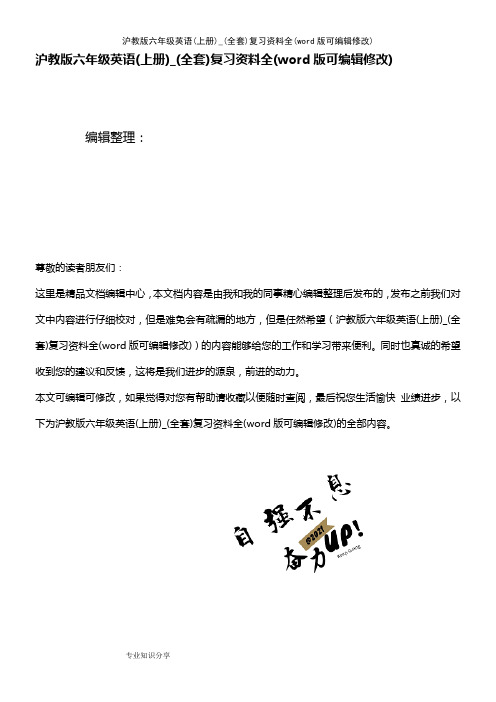
沪教版六年级英语(上册)_(全套)复习资料全(word版可编辑修改)编辑整理:尊敬的读者朋友们:这里是精品文档编辑中心,本文档内容是由我和我的同事精心编辑整理后发布的,发布之前我们对文中内容进行仔细校对,但是难免会有疏漏的地方,但是任然希望(沪教版六年级英语(上册)_(全套)复习资料全(word版可编辑修改))的内容能够给您的工作和学习带来便利。
同时也真诚的希望收到您的建议和反馈,这将是我们进步的源泉,前进的动力。
本文可编辑可修改,如果觉得对您有帮助请收藏以便随时查阅,最后祝您生活愉快业绩进步,以下为沪教版六年级英语(上册)_(全套)复习资料全(word版可编辑修改)的全部内容。
Unit 1 Family and relatives1。
family and relatives家庭和亲戚2. a family tree一个家谱3. grandsons and granddaughters孙子和孙女们/外孙和外孙女们4. get a lot of presents得到许多礼物5。
Happy Birthday (to sb。
)!生日快乐!6. get a birthday card from sb。
从某人那儿得到一张生日卡7。
one of my family members我的家庭成员之一8。
only have one aunt仅仅有一个阿姨9. my classmates我的同班同学10。
go shopping去购物11。
what else其他什么12。
play badminton打羽毛球13。
go cycling去骑自行车14。
go swimming去游泳15. two cousins两个堂/表兄弟/妹16. how many + 名词复数多少……语言点1.介绍This is.。
..。
./These are.。
.。
.这是..。
.。
./这些是。
..。
This is my grandfather.这是我的(外)祖父。
沪教版六年级英语复习资料(已标注重点)
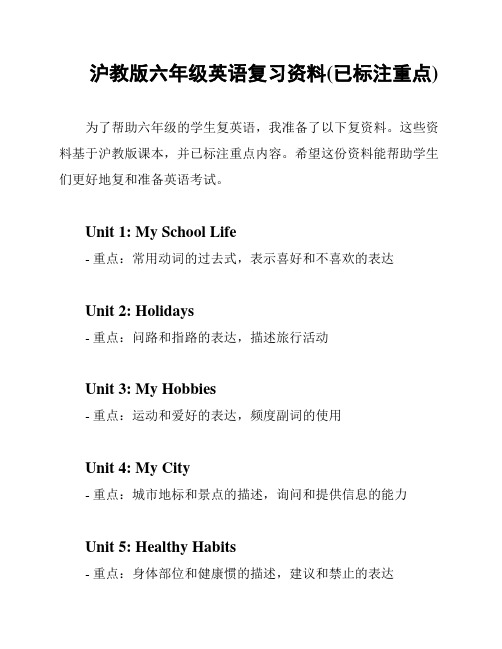
沪教版六年级英语复习资料(已标注重点)
为了帮助六年级的学生复英语,我准备了以下复资料。
这些资料基于沪教版课本,并已标注重点内容。
希望这份资料能帮助学生们更好地复和准备英语考试。
Unit 1: My School Life
- 重点:常用动词的过去式,表示喜好和不喜欢的表达
Unit 2: Holidays
- 重点:问路和指路的表达,描述旅行活动
Unit 3: My Hobbies
- 重点:运动和爱好的表达,频度副词的使用
Unit 4: My City
- 重点:城市地标和景点的描述,询问和提供信息的能力
Unit 5: Healthy Habits
- 重点:身体部位和健康惯的描述,建议和禁止的表达
Unit 6: At the Zoo
- 重点:描述动物的外貌和行为,询问和提供信息的能力
Unit 7: Food and Drinks
- 重点:食物和饮料的名称,句式“What do you want?”的用法
Unit 8: My Family
- 重点:家庭成员和关系的描述,家庭活动的表达
Unit 9: My Daily Routine
- 重点:日常活动的表达,日常时间的描述
Unit 10: Jobs
- 重点:职业名称和工作内容的描述,询问和回答关于职业的问题
以上是本复资料的主要内容。
希望学生们能通过复这些重点内容来巩固英语知识,取得优异的成绩。
祝大家研究愉快!
(注意:本文档内容仅供复习参考,具体考试内容以教材为准。
)。
【深圳市】沪教版六年级英语(上册)-(全套)复习资料全

Unit 1 Family and relatives1. family and relatives 家庭和亲戚2. a family tree 一个家谱3. grandsons and granddaughters 孙子和孙女们/外孙和外孙女们4. get a lot of presents 得到许多礼物5. Happy Birthday (to sb.) ! 生日快乐!6. get a birthday card from sb. 从某人那儿得到一张生日卡7. one of my family members 我的家庭成员之一8. only have one aunt 仅仅有一个阿姨9. my classmates 我的同班同学10. go shopping 去购物11. what else 其他什么12. play badminton 打羽毛球13. go cycling 去骑自行车14. go swimming 去游泳15. two cousins 两个堂/表兄弟/妹16. how many + 名词复数多少……语言点1.介绍 This is....../These are......这是....../这些是...... This is my grandfather.这是我的(外)祖父。
These are my family and relatives.这些是我的家人和亲戚。
注意句中各成分保持单复数同形。
2. I‟m their son.. 我是他们的儿子。
We‟re their sons.我们是他们的儿子。
3. 询问信息Who is this?/Who are these?这是谁?/这些是谁?How old is......? ......几岁?A:How many......have you got?你有多少......? B:I have got ...... / I have only got one......我有....../我只有一个......A:What do you usually do with your......?你通常和你的......做......?B:I always/usually/sometimes/never do sth. with my......我总是/通常/有时候/从不和我的...做...How many uncles do you have?你有多少个叔叔? How many后面接可数名词的复数形式。
word完整版牛津沪教版英语六年级上重点知识复习及练习

牛津沪教版英语六年级上重点知识复习及练习六年级上重点知识复习及练习Part 1单词梳1spendv.度拓spend v.花b spend some time / some money (in) doing sthsb spend some time / some money on sthEg: Lucy spends five hours in doing her homework..注spend-spent-spent. cost花sth cost sb some money.某物花费了某人多少take花It takes sb some time to do sth做某事花了某人多久时2islandn.岛住在某岛live on.Eg: He lives on Chong Ming Island.3bayn.海近义harbour海4weekendn.周短语at weekends在周5seasiden.海拓side n.6luckyadj.幸运的,好运luckilyadv.反义unlucky; unluckily7.marketn.市supermarket超8. activityn.活activities(复active adj.活跃barbecuen.烧10.sandcastlen.沙11. collectv收collectionn.收集物(可数12. plan v.计短语plan to do sth.计划做某Eg: I plan to buy a new bag.13. shallmodal v.将要,好吗(主要对第一人称复数提问Eg: Shall we go out and play together?过去should14. cost花短语sth cost sb some money.某物花费了某人多少Eg: The book costs me ten dollars.15. trip n.旅短语a trip/ visit to some plac去某地旅8/ 1牛津沪教版英语六年级上重点知识复习及练习Part 2 短语整理一起在外度过一天 1. spend a day out together在绿岛2. on Green Island在快乐3. in Happy Town在龙4. in Dragon Bay在幸运岛5. on Lucky Island在周6. at weekends = at the weekend离开某地近7. be near sp.离开某地远8. be far (away) from sp海边9. Seaside Town一张我家人和我的照10. a photo of my family and me一起吃午11. have lunch together格林市12. Green Market在太阳13. In Sunny Town太空博物14. Space Museum在月亮15. In Moon Town一项活16. an activity进行一次烧17. have a barbecue放风18. fly kites骑自行19. ride bicycles筑沙20. make sandcastles收集贝21. collect shells制作一本照片22. make an album计划做某23. plan to do sth.一个好主24. a good idea哪一个地25. which place计划一次旅26. plan a trip……怎么样?(常用于表示建议或提议27. How abou打算做28. be going to + v.Part 3基础练一单项选-ups _________ this .( ) 1 . Let's do some pusD . withB . forC . like A . at) 2 . Boys are interested __________ ball games .(D . in playC . to played A . in playing B . at play) 3 . This room is ____________ .(D . Alice and Betty'C . Mary's and Joan' A . Tom's and Mik B . Alice and Lucy ) 4 . Why not __________ for a walk ?(D . goingB . go C . went A . to go) 5 . How _________ the little girl walks !(D . more quicklyC . quicker A . quick B . quickly) 6 . We hope _________ the game .(D . to winningB . wonC . to win A . winning) 7 . The accident happened _________ a cold winter evening .(D . inC . on B . at A . from8/ 2牛津沪教版英语六年级上重点知识复习及练习) 8 . Let's read the text , _____________ ?(D . do you C. will you A . do we B . shall we”in English ?( ) 9 . How can you ________ “在晚D . talkC . say A . speak B . tell ) 10 . Sports can keep us __________ .(D . healthyC . unhealthy A . health B . healthily用所给单词的适当形式填1. What would you like _________ (have) for your dinner tonight?2. You have enough time to do the work. You don't need _________ (finish) it nowyou a shirt for your birthday. What colour do you like bestbu3. Bill, let me _________4. Where will we go __________ (look) for the missing mobile phone?5. Tom asked me if I would go _________ (windsurf) with him.Let' s take the elevato.(four)6. Toys for Kids is on the______ floor.(shop)7. Most of the_____ _malls in Canada are near city centres,I' 11 wear the T - shirt with the long______. ( sleeve)8. It' 11 be very sunny tomorrow.(change) Can I try on the shirt in the______ room? Of course you can.9.改写句保持愿意不)1. How about taking a walk after dinner? take walk after dinner._________ __________保持愿意不)2. He wouldn't like to be a cook in the future. to be a cook in the future.He ___________ ______________)3. The book cost me 20 yuan. 划线部分提the book cost ?________ __________4. Kitty is a very friendly student. 感叹)Kitty is!________ ________)5. He is our Chinese teacher. 保持愿意不Chinese.He _________ _________改为否定)6. She helps me clean the house. clean the house.She ________ __________Part 4综合练Reading and comprehensionAThis is a question many students ask. In my opinion, the most effective way is to learnHow can I learn English well?nlessons by heart. If you can recite the text and write it out, you've learned it fairly well. And if you can tell, in your oy successful learner indeed. Your English will be quite perfect.words, what the lesson says you're a veyouThis is a difficult task. However, if you try to learn by heart only part of each lesson, you'll find it not half so hard asmight have thought.towayonouranecessary.writingisalsoIthelpsyoulotcourse,progress.makeyouthisLearningway,willrapidOf success in English.Equally important is to feel the language. You should be able to laugh at jokes and be shocked at bad news. When usingEnglish, try to forget your mother tongue. Instead of helping you, your own language gets in your way. So, never try to seeEnglish through translation.1.In the writer's opinion, the most effective way in learning English is ____A.to practise speaking, writing and feeling itB.to forget your own native languageC.to translate everything into his own languageD.to memorize the English words and grammatical rules8/ 3牛津沪教版英语六年级上重点知识复习及练习2. “Instead of helping you, your own language gets in your way.”This sentence means that memorizing your own languagecan ________.B.stop you mastering English A.help you to study English wellD.help you notice mistakesC.make English easy to learn3.Equally important is to feel the language. “to feel the language”here means________.A.to get a knowledge of English by touchingB.to be able to read and write EnglishC.to translate English into your own by imaginingD.to be able to experience the rich sensation of the languageBWhen we can see well, we do not think about our eyes often. It is only when we can not see perfectly that we come to seehow important our eyes are.People who are nearsighted can only see things that are very close to their eyes. Many people who do a lot of close work,such as writing and reading, become nearsighted. Then they have to wear glasses in order to see distant things clearly.People who are farsighted face just the opposite problem. They can see things that are far away, but they have difficultyget glasses too.reading a book unless they hold it at arm's length. If they want to do much reading, they musOther people do not see clearly because their eyes are not exactly the right shape. This, too, can be corrected by glasses.isSome people's eyes become cloudy because of cataracts. Long ago these people often became blind. Now, however, itpossible to operate on the cataracts and remove them.When night falls, colors become fainter to the eyes and finally disappear. After your eyes have grown used to the dark, youcan see better if you use the side of your eyes rather than the centers. Sometimes, after dark, you see a small thing to oneside of you, which seems to disappear if you turn your head in its direction. This is because when you turn your head, youat the thing too directly. Men on guard duty sometimes think they see something moving to one side of them.arelookinthismistaken.However,andtheybelievetheywerestraightatit,theycannotseeitanymore,Whentheytur ntolookmistake happens because the center of the eye, which is very sensitive in daylight, is not as sensitive as the sides of the eyeafter dark.4.We don't know that our eyes are of great importance until ________B. we cannot see clearlyA. we think about our eyesD. we have to do much readingC. we wear glasses5.According to the passage, a ________ is more likely to be nearsighted.D.painterC. guardA.tailorB. doctor6.People who are farsighted ________ .A.cannot do a lot of close work without glassesB.can only see things that are very close to their eyesC.have difficuly reading a book if they hold it at arm's lengtD.have the same problem as the nearsighted people7.To see a small thing at night, it is better to look ________ .B.with half shut or narrowed eyesA.with wide open eyesD.in a slightly different directionC.straight at itC Read and answer the questions.difference.noofbirthdays.庆)theirAmericanchildrenaretowordoverfromChildrenallthelikecelebrateAmerican children usually celebrate with a party. They invite their friends to join the party. The party may not be held on theexact date of birthday if it comes to a school day. It may be held on the closest weekend instead. Today two kinds of parties are the most popular. One is held at home. Parents make their house beautiful with balloonsand coloured paper. They prepare a special birthday meal. The children play games. The other one is held away from home.Some are at a special restaurant. The children eat pizza and ice cream. The waiters, who serve the food, also sing and telljokes to the children. Other parties may be held at a park, a movie theatre or some other places.8/ 4牛津沪教版英语六年级上重点知识复习及练习Every birthday party has a birthday cake with candles on it. There is one candle for each year of a birthday boy. or girl'sage. When the candles are lighted, everyone sings the special birthday song: HAPPY BIRTHDAY TO YOU.79. When will they hold their birthday party if the birthday comes to a school day?________________________________________________________80. Are there only two kinds of parties?________________________________________________________81. Are parents very busy when the party is held at home?________________________________________________________82. What do the waiters do to the children to celebrate their birthday?________________________________________________________83. Where may other parties beheld?________________________________________________________84. When you are twelve years old, how many candles do you need?________________________________________________________首字母填Dclasses. They can do things they want to do. Mary will go to the1It's Sunday today. The students have n hard.3to see a film with her friends. Tony and some other boys are going to play football. Eddiewc____2__on TV. They will b__6___to the library to read the books. John is going to watch a football m5He is g4 very happy..__________ 6. __________1. __________ 2. __________ 3. ___________ 4. ________四.练I用现在进行时改写句Tom can speak Chinese.1We have four lessons.23I watch TV everyday.She works in a hospital.4.):选择最恰当的答I. Choose the best answer Lucky Island?___________1.Where have you beenD. fromC. inA. atB. on.2.Look, this is a photo of____________D. I and youB. me and youA. you and IC. you and me__________ China. People usually go there by air.3.The USA isD. far away fromB. awayC. far awayA. farHave you ever been to Thailand?4.wice.Yes, I have. I have been _____________D. itC. thereA. to thereB. to it8/ 5牛津沪教版英语六年级上重点知识复习及练习___________ your father usually ____________ at weekends?_5. WhatD. will; do C. did; do A. do; do B. does; do. 6. Alice is a friend ofD.mineB. IC.myA. mepiano.7.Jack likes to playfootball. His sister, Mary, likes to playD./;/B. the;theC./;theA. the; /Shanghai.8.Here is a mapD. atC. forA. ofB. inin her spare time.9.My mother likesB.to go shopsA. go shoppingD. to going shoppingC. going shoppingseven o'clock.10. He arrived at the History MuseumD. onforB. inC.A. at11. We are going to visit the Bund _____________ .B. last SundayA. next SundayD. the SundayC. on SundaysHow can we get to the Space Museum?12.bus.Let's go ______________D. at aA. onB. byC. in afilm?13.I feel so bored. How about _____________D. seeingC. to seeingA. to seeB. see?14.What time will you come ____________D. backC. to homeA. thereB. to here____________ happily.15.Look, the studentsB. playA. are playingD.is playinC. played. Complete the sentences with the given words in their proper forms 用所给单词的适当形式完成句)of my family and me. (photo)1. These are somecenters in Shanghai. (shop)2. There are a lot of_______________ . (birth)3. Tomorrow will be my tenth4. This is a photo of Ben and_______________ father. (he)here. (friendly)5. He got some new______________True or False. 阅读短文,判断正It's Sunday today. It's five o'clock in the afternoon. Dick is going to the supermarket with his parents. His father is nowcleaning the car. He is going to drive his family to the supermarket. It is far away from their home. His mother is going tbuy a lot of food: bread, milk, fruit and drinks. She also wants to buy many other things for the next week. Dick wants tobuy a video game machine. His father says to him, 'OK, but you mustn't play video games all the time.After class you mustgo over your lessons and do your homework first.'They are going to have dinner there and come back at nine o'clock in the evening.They will enjoy themselves very much.Dick and his parents are going to do some shopping today.) 1(8/ 6牛津沪教版英语六年级上重点知识复习及练习They are going to the supermarket by bus. ( ) 2The supermarket is not far away from their home.( ) 3Dick's mother is going to buy a lot of food for the next week.) 4 (Dick is going to buy a video game machine but he can't play it all the time. ( ) 5They are going to stay in the supermarket for 5 hours.( ) 6.Choose the right answer. ⅤIt's Sunday. Mother, father and the children are going to the beach.Where are we going, Dad? Alice:Let's look at the map. Let me see. We will go to the East Point Beach. Father.We'll swim in the sea. Mother:Are we going to have a picnic? David:Alice: Yes, of course.David: That's nice.Father: Come on! Let's all get in the car!怎么了), Dad? Alice: What's wrong ( )! 发动Father: The car can't start ( Mother: So we will all stay at home.Let's have a picnic in the garden! Alice:Great!David:.)1 The family is going to ____________ (C. swim and have a picnicB. have a picnicA. swim in the sea___________ ._ ( )2 They are going thereC. by underground B. by carA. by bus______________ .)3 They won't go to the beach (because it is rainy A.because Father is not fine B.because the car doesn't startC.They will have the picnic _____________ in the end.( ) 4A. on the beachin the garden B.in the car C.Ⅵ.Read the passage and fill in the blanks with proper words.It will be grandfather's s______________ birthday next Sunday. We are going to have a big birthday p____________.c______________for a to I him. some will and Uncles aunts buy p______________for But want make nice birthdaygrandfather. Mum and Dad are going to buy a lot of food from the s______________.】【Keys 1. Tom is speaking Chinese. I.8/ 7牛津沪教版英语六年级上重点知识复习及练习2. We are having four lessons.3. I am watching TV now.4. She is working in a hospital.5. Are you reading this book?6. Kitty and Ben are having lunch at about twelve.7. His father is helping them.8. They are watching TV in the evening.11-15 ABDD6-1DCACAII. 1-BCDCB5. friends4. his. 1. photos2. shopping3. birthday. TFFTTF. CBCB. sixtieth/ seventieth, party, presents, cake, supermarket.8/ 8。
(word完整版)牛津沪教版英语六年级上重点知识复习及练习
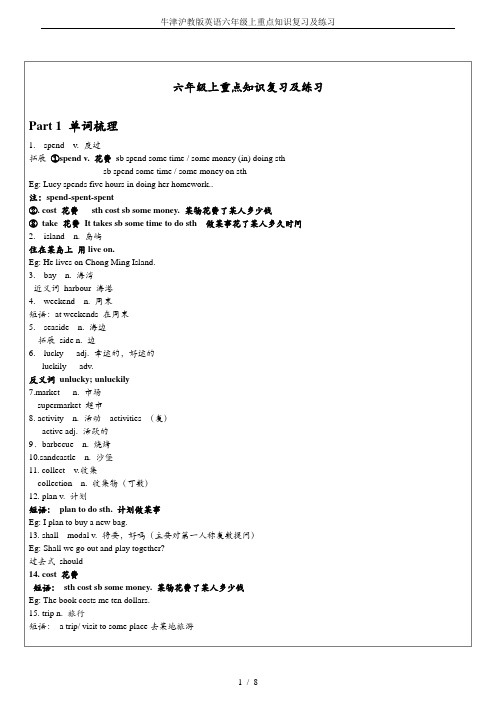
2. “Instead of helping you, your own language gets in your way.”This sentence means that memorizing your own language can ________.A.help you to study English wellB.stop you mastering EnglishC.make English easy to learnD.help you notice mistakes3.Equally important is to feel the language. “to feel the language” here means________.A.to get a knowledge of English by touchingB.to be able to read and write EnglishC.to translate English into your own by imaginingD.to be able to experience the rich sensation of the languageBWhen we can see well, we do not think about our eyes often. It is only when we can not see perfectly that we come to see how important our eyes are.People who are nearsighted can only see things that are very close to their eyes. Many people who do a lot of close work, such as writing and reading, become nearsighted. Then they have to wear glasses in order to see distant things clearly. People who are farsighted face just the opposite problem. They can see things that are far away, but they have difficulty reading a book unless they hold it at arm’s length. If they want to do much reading, they must get glasses too.Other people do not see clearly because their eyes are not exactly the right shape. This, too, can be corrected by glasses. Some people’s eyes become cloudy because of cataracts. Long ago these people often became blind. Now, however, it is possible to operate on the cataracts and remove them.When night falls, colors become fainter to the eyes and finally disappear. After your eyes have grown used to the dark, you can see better if you use the side of your eyes rather than the centers. Sometimes, after dark, you see a small thing to one side of you, which seems to disappear if you turn your head in its direction. This is because when you turn your head, you are looking at the thing too directly. Men on guard duty sometimes think they see something moving to one side of them. When they turn to look straight at it, they can not see it any more, and they believe they were mistaken. However, this mistake happens because the center of the eye, which is very sensitive in daylight, is not as sensitive as the sides of the eye after dark.4.We don’t know that our eyes are of great importance until ________.A. we think about our eyesB. we cannot see clearlyC. we wear glassesD. we have to do much reading5.According to the passage, a ________ is more likely to be nearsighted.A.tailorB. doctorC. guardD.painter6.People who are farsighted ________ .A.cannot do a lot of close work without glassesB.can only see things that are very close to their eyesC.have difficult y reading a book if they hold it at arm’s lengthD.have the same problem as the nearsighted people7.To see a small thing at night, it is better to look ________ .A.with wide open eyesB.with half shut or narrowed eyesC.straight at itD.in a slightly different directionC Read and answer the questions.Children from all over the word like to celebrate (庆祝) their birthdays. American children are of no difference. American children usually celebrate with a party. They invite their friends to join the party. The party may not be held on the exact date of birthday if it comes to a school day. It may be held on the closest weekend instead.Today two kinds of parties are the most popular. One is held at home. Parents make their house beautiful with balloons and coloured paper. They prepare a special birthday meal. The children play games. The other one is held away from home. Some are at a special restaurant. The children eat pizza and ice cream. The waiters, who serve the food, also sing and tell jokes to the children. Other parties may be held at a park, a movie theatre or some other places.( ) 2 They are going to the supermarket by bus.( ) 3 The supermarket is not far away from their home.( ) 4 Dick's mother is going to buy a lot of food for the next week.( ) 5 Dick is going to buy a video game machine but he can't play it all the time.( ) 6 They are going to stay in the supermarket for 5 hours.Ⅴ.Choose the right answer.It's Sunday. Mother, father and the children are going to the beach.Alice: Where are we going, Dad?Father. Let's look at the map. Let me see. We will go to the East Point Beach.Mother: We'll swim in the sea.David: Are we going to have a picnic?Alice: Yes, of course.David: That's nice.Father: Come on! Let's all get in the car!Alice: What's wrong (怎么了), Dad?Father: The car can't start (发动)!Mother: So we will all stay at home.Alice: Let's have a picnic in the garden!David: Great!( )1 The family is going to ____________ .A. swim in the seaB. have a picnicC. swim and have a picnic( )2 They are going there ____________ .A. by busB. by carC. by underground( )3 They won't go to the beach ______________ .A. because it is rainyB. because Father is not fineC. because the car doesn't start( ) 4 They will have the picnic _____________ in the end.A. on the beachB. in the gardenC. in the carⅥ.Read the passage and fill in the blanks with proper words.It will be grandfather's s______________ birthday next Sunday. We are going to have a big birthday p____________. Uncles and aunts will buy some p______________for him. But I want to make a nice birthday c______________for grandfather. Mum and Dad are going to buy a lot of food from the s______________.【Keys】I. 1. Tom is speaking Chinese.。
沪教版六年级英语上册-全套复习资料

—-可编辑修改,可打印——别找了你想要的都有!精品教育资料——全册教案,,试卷,教学课件,教学设计等一站式服务——全力满足教学需求,真实规划教学环节最新全面教学资源,打造完美教学模式Unit 1 Family and relatives1. family and relatives 家庭和亲戚2. a family tree 一个家谱3. grandsons and granddaughters 孙子和孙女们/外孙和外孙女们4. get a lot of presents 得到许多礼物5. Happy Birthday (to sb.) ! 生日快乐!6. get a birthday card from sb. 从某人那儿得到一张生日卡7. one of my family members 我的家庭成员之一8. only have one aunt 仅仅有一个阿姨9. my classmates 我的同班同学10. go shopping 去购物11. what else 其他什么12. play badminton 打羽毛球13. go cycling 去骑自行车14. go swimming 去游泳15. two cousins 两个堂/表兄弟/妹16. how many + 名词复数多少……语言点1.介绍 This is....../These are......这是....../这些是...... This is my grandfather.这是我的(外)祖父。
These are my family and relatives.这些是我的家人和亲戚。
注意句中各成分保持单复数同形。
2. I‟m their son.. 我是他们的儿子。
We‟re their sons.我们是他们的儿子。
3. 询问信息Who is this?/Who are these?这是谁?/这些是谁?How old is......? ......几岁?A:How many......have you got?你有多少......? B:I have got ...... / I have only got one......我有....../我只有一个......A:What do you usually do with your......?你通常和你的......做......?B:I always/usually/sometimes/never do sth. with my......我总是/通常/有时候/从不和我的...做...How many uncles do you have?你有多少个叔叔? How many后面接可数名词的复数形式。
【英语】沪教版六年级英语上册全套复习资料

文档来源为:从网络收集整理.word版本可编辑.欢迎下载支持. 【关键字】英语Unit 1 Family and relatives1. family and relatives 家庭和亲戚2. a family tree 一个家谱3. grandsons and granddaughters 孙子和孙女们/外孙和外孙女们4. get a lot of presents 得到许多礼物5. Happy Birthday (to sb.) ! 生日快乐!6. get a birthday card from sb. 从某人那儿得到一张生日卡7. one of my family members 我的家庭成员之一8. only have one aunt 仅仅有一个阿姨9. my classmates 我的同班同学10. go shopping 去购物11. what else 其他什么12. play badminton 打羽毛球13. go cycling 去骑自行车14. go swimming 去游泳15. two cousins 两个堂/表兄弟/妹16. how many + 名词复数多少……语言点1.介绍 This is....../These are......这是....../这些是......This is my grandfather.这是我的(外)祖父。
These are my family and relatives.这些是我的家人和亲戚。
注意句中各成分保持单复数同形。
2. I‟m their son.. 我是他们的儿子。
We‟re their sons.我们是他们的儿子。
3. 询问信息Who is this?/Who are these?这是谁?/这些是谁?How old is......? ......几岁?A:How many......have you got?你有多少......?B:I have got ...... / I have only got one......我有....../我只有一个......A:What do you usually do with your......?你通常和你的......做......?B:I always/usually/sometimes/never do sth. with my......我总是/通常/有时候/从不和我的...做...How many uncles do you have?你有多少个叔叔? How many后面接可数名词的复数形式。
沪教版六年级英语上册-全套复习资料

Unit 1 Family and relatives1. family and relatives 家庭和亲戚2. a family tree 一个家谱3. grandsons and granddaughters 孙子和孙女们/外孙和外孙女们4. get a lot of presents 得到许多礼物5. Happy Birthday (to sb.) ! 生日快乐!6. get a birthday card from sb. 从某人那儿得到一张生日卡7. one of my family members 我的家庭成员之一8. only have one aunt 仅仅有一个阿姨9. my classmates 我的同班同学10. go shopping 去购物11. what else 其他什么12. play badminton 打羽毛球13. go cycling 去骑自行车14. go swimming 去游泳15. two cousins 两个堂/表兄弟/妹16. how many + 名词复数多少……语言点1.介绍 This is....../These are......这是....../这些是......This is my grandfather.这是我的(外)祖父。
These are my family and relatives.这些是我的家人和亲戚。
注意句中各成分保持单复数同形。
2. I‟m their son.. 我是他们的儿子。
We‟re their sons.我们是他们的儿子。
3. 询问信息Who is this?/Who are these?这是谁?/这些是谁?How old is......? ......几岁?A:How many......have you got?你有多少......?B:I have got ...... / I have only got one......我有....../我只有一个......A:What do you usually do with your......?你通常和你的......做......?B:I always/usually/sometimes/never do sth. with my......我总是/通常/有时候/从不和我的...做... How many uncles do you have?你有多少个叔叔? How many后面接可数名词的复数形式。
沪教版六年级英语上册全册单元知识点
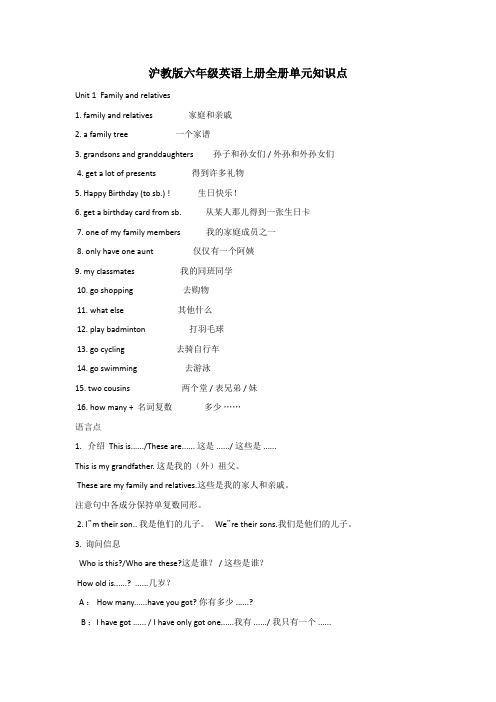
沪教版六年级英语上册全册单元知识点Unit 1 Family and relatives1. family and relatives 家庭和亲戚2. a family tree 一个家谱3. grandsons and granddaughters 孙子和孙女们 / 外孙和外孙女们4. get a lot of presents 得到许多礼物5. Happy Birthday (to sb.) ! 生日快乐!6. get a birthday card from sb. 从某人那儿得到一张生日卡7. one of my family members 我的家庭成员之一8. only have one aunt 仅仅有一个阿姨9. my classmates 我的同班同学10. go shopping 去购物11. what else 其他什么12. play badminton 打羽毛球13. go cycling 去骑自行车14. go swimming 去游泳15. two cousins 两个堂 / 表兄弟 / 妹16. how many + 名词复数多少……语言点1. 介绍 This is....../These are...... 这是 ....../ 这些是 ......This is my grandfather. 这是我的(外)祖父。
These are my family and relatives.这些是我的家人和亲戚。
注意句中各成分保持单复数同形。
2. I‟m their son.. 我是他们的儿子。
We‟re their sons.我们是他们的儿子。
3. 询问信息Who is this?/Who are these?这是谁? / 这些是谁?How old is......? ......几岁?A : How many......have you got? 你有多少 ......?B :I have got ...... / I have only got one......我有 ....../ 我只有一个 ......A : What do you usually do with your......? 你通常和你的 ...... 做......?B :I always/usually/sometimes/never do sth. with my......我总是 / 通常 / 有时候 / 从不和我的 ... 做 ...How many uncles do you have?你有多少个叔叔? How many 后面接可数名词的复数形式。
沪教版六年级英语上册-全套复习资料【范本模板】
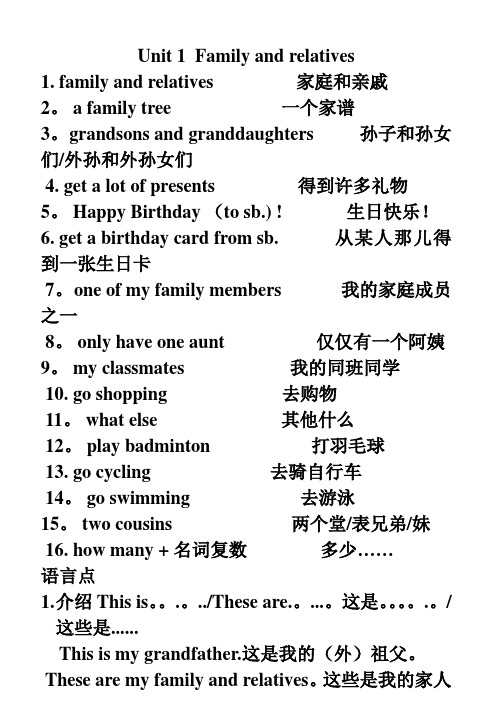
Unit 1 Family and relatives1. family and relatives 家庭和亲戚2。
a family tree 一个家谱3。
grandsons and granddaughters 孙子和孙女们/外孙和外孙女们4. get a lot of presents 得到许多礼物5。
Happy Birthday (to sb.) ! 生日快乐!6. get a birthday card from sb. 从某人那儿得到一张生日卡7。
one of my family members 我的家庭成员之一8。
only have one aunt 仅仅有一个阿姨9。
my classmates 我的同班同学10. go shopping 去购物11。
what else 其他什么12。
play badminton 打羽毛球13. go cycling 去骑自行车14。
go swimming 去游泳15。
two cousins 两个堂/表兄弟/妹 16. how many + 名词复数多少……语言点1.介绍 This is。
.。
../These are.。
...。
这是。
.。
/这些是......This is my grandfather.这是我的(外)祖父。
These are my family and relatives。
这些是我的家人和亲戚。
注意句中各成分保持单复数同形。
2。
I‟m their son。
. 我是他们的儿子。
We‟re their sons。
我们是他们的儿子。
3。
询问信息Who is this?/Who are these?这是谁?/这些是谁?How old is....。
.? 。
.。
.。
.几岁?A:How many.。
.。
have you got?你有多少。
..?B:I have got ..。
.。
/ I have only got one.。
沪教版六年级英语(上册)_(全套)复习全全资料全
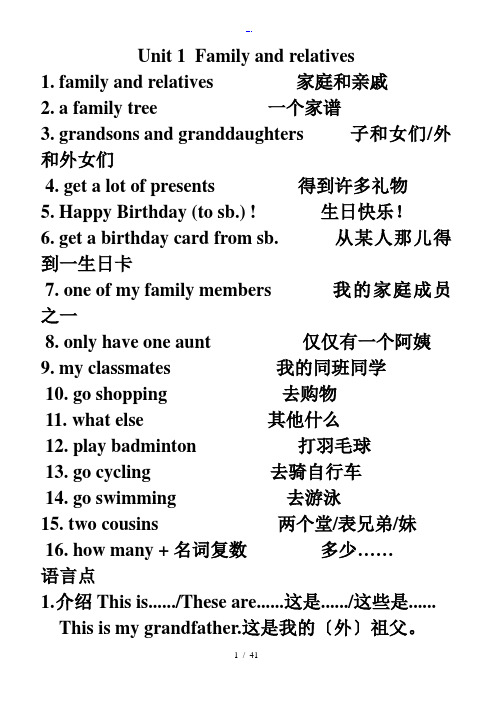
Unit 1 Family and relatives1. family and relatives 家庭和亲戚2. a family tree 一个家谱3. grandsons and granddaughters 子和女们/外和外女们4. get a lot of presents 得到许多礼物5. Happy Birthday (to sb.) ! 生日快乐!6. get a birthday card from sb. 从某人那儿得到一生日卡7. one of my family members 我的家庭成员之一8. only have one aunt 仅仅有一个阿姨9. my classmates 我的同班同学10. go shopping 去购物11. what else 其他什么12. play badminton 打羽毛球13. go cycling 去骑自行车14. go swimming 去游泳15. two cousins 两个堂/表兄弟/妹16. how many + 名词复数多少……语言点1.介绍 This is....../These are......这是....../这些是...... This is my grandfather.这是我的〔外〕祖父。
These are my family and relatives.这些是我的家人和亲戚。
注意句中各成分保持单复数同形。
2. I‟m their son.. 我是他们的儿子。
We‟re their sons.我们是他们的儿子。
3. 询问信息Who is this?/Who are these?这是谁?/这些是谁?How old is......? ......几岁?A:How many......have you got?你有多少......? B:I have got ...... / I have only got one......我有....../我只有一个......A:What do you usually do with your......?你通常和你的......做......?B:I always/usually/sometimes/never do sth. with my......我总是/通常/有时候/从不和我的...做...How many uncles do you have?你有多少个叔叔? How many后面接可数名词的复数形式。
- 1、下载文档前请自行甄别文档内容的完整性,平台不提供额外的编辑、内容补充、找答案等附加服务。
- 2、"仅部分预览"的文档,不可在线预览部分如存在完整性等问题,可反馈申请退款(可完整预览的文档不适用该条件!)。
- 3、如文档侵犯您的权益,请联系客服反馈,我们会尽快为您处理(人工客服工作时间:9:00-18:30)。
Unit 1 Family and relatives1. family and relatives 家庭和亲戚2. a family tree 一个家谱3. grandsons and granddaughters 孙子和孙女们/外孙和外孙女们4. get a lot of presents 得到许多礼物5. Happy Birthday (to sb.) ! 生日快乐!6. get a birthday card from sb. 从某人那儿得到一张生日卡7. one of my family members 我的家庭成员之一8. only have one aunt 仅仅有一个阿姨9. my classmates 我的同班同学10. go shopping 去购物11. what else 其他什么12. play badminton 打羽毛球13. go cycling 去骑自行车14. go swimming 去游泳15. two cousins 两个堂/表兄弟/妹16. how many + 名词复数多少……语言点1.介绍 This is....../These are......这是....../这些是......This is my grandfather.这是我的(外)祖父。
These are my family and relatives.这些是我的家人和亲戚。
注意句中各成分保持单复数同形。
2. I‟m their son.. 我是他们的儿子。
We‟re their sons.我们是他们的儿子。
3. 询问信息Who is this?/Who are these?这是谁?/这些是谁?How old is......? ......几岁?A:How many......have you got?你有多少......?B:I have got ...... / I have only got one......我有....../我只有一个......A:What do you usually do with your......?你通常和你的......做......?B:I always/usually/sometimes/never do sth. with my......我总是/通常/有时候/从不和我的...做... How many uncles do you have?你有多少个叔叔? How many后面接可数名词的复数形式。
4. What do you do with your…?你和你的…干什么?5. What else do you do with your…?你和你的…还干什么?6. What else do you do with your…?你和你的…还干什么?With是个介词,后面接人称代词时,要用宾格的形式。
With me/him/her/it/us /them7. always/sometimes/usually是频度副词,提问应该要用How often…?通常情况下常用于一般现在时态的句子中,表示经常发生的习惯性动作或自然现象或事实。
always表示动作的重复频率最高,usually其次,sometimes再次,never表示动作从未发生。
I often tell him about school.我经常告诉他关于学校的事。
I never show them my homework.我从未给他们看我的家庭作业。
8.形容词比较级的用法:Your brother looks shorter than you.你的兄弟看上去比你矮。
Your uncle looks older than mine.你的叔叔看上去比我的叔叔年纪大。
9. look(连系动词)+ adj. “看起来......” Jim looks happy today.Unit2I 词组:1. talk to her: 和她谈话2. not…at all:一点也不,根本不3. go out at night:晚上出去4. like to be together:喜欢在一起5. walk to school:步行上学6. help each other:互相帮助7. help other people:帮助别人8. work hard:学习努力9. get angry:生气10. share her food with me:和我分享她的食物 11. tell lies:撒谎12. live in the USA:住在美国13. for the first time:第一次14. on Saturday:在周六15. Friends of the Earth:地球之友16. look after the environment:保护环境17. pollute the environment:污染环境18. help keep the environment clean:帮助保持环境整洁19. pick up rubbish:捡起垃圾20. put rubbish into rubbish bins:把垃圾扔到垃圾箱里21. tell people not to leave rubbish:告诉人们不要丢垃圾II. 词性转换:1.friend n. 朋友 friendly adj. 友好的* friendship n.友谊2.help n./v.帮助 helpful adj.有帮助的 * helpless adj.无帮助的3.one的序数词 first4.pollute v. 污染 pollution n.污染5.discuss v. 讨论 *discussion n. 讨论e n.用法,用处 v.使用 useful adj.有用的* reuse v. 再利用III. 语言点/句型1. I always talk to her. 和某人谈话:talk to sb. 谈论某事:talk about sth.和某人谈论某事:talk to sb. about sth. *和某人交谈:talk with sb.e.g. Now my teacher is talking to Alice. Let’s talk about our plan for the trip.We can talk to our parents about the problem. *My uncle is very funny. I like to talk with hi m.2.But she doesn’t talk at all. not…at all: 一点也不Not at all: 不用谢,没关系e.g. 1) It isn’t clean at all.2)—Thank you very much. —Not at all.3. She likes to play.They like to be together.喜欢做某事:like to do sth.= like doing sth.e.g. He doesn’t like smoking.= He doesn’t like to smoke.4.She can’t read or write.肯定句中连接并列成分的and 变为否定句, 要改成or e.g. She can sing and dance.否定句:She can’t sing or dance.5.They walk to school together.步行上学:walk to school = go to school on foote.g. Ben walks to school every day.= Ben goes to school on foot every day.6.She always shares her food with me.和某人分享某物:share sth. with sb. e.g. Kitty shares a room with her sister.I like to share the good time with my good friends.7.They help each other. 互相帮助:help each other 相爱:love each other互相学习:learn from each othere.g. My father and mother love each other.We should help each other and learn from each other.8. She always works hard.努力工作:work hard= be hardworkinge.g. My teacher always works hard. =My teacher is always hardworking.9.She never tells lies. 撒谎:tell a lie = tell liese.g. Tom isn’t honest. He usually tells lies.=He usually tells a lie.10.Kitty’s cousin lives in the USA. 居住在某地:live in sp. 美国:the USA=Americae.g. She lives in Rose Garden Estate.11.Kitty and Alice are asking Winne about where she has been in Garden City.向某人询问某事:ask sb. about sth. e.g. Don’t ask me about my salary.12.I’m going there on Saturday.在星期几和具体日期前要用介词 one.g. Let’s go to have a barbecue on Sunday.13.Kitty: Have you been to Ocean Park yet, Winne?Winne:No, I haven’t been to Ocean Park yet.Alice:Have you been to Garden City Zoo yet?Winne: Yes, I’ve just been to Garden City Zoo.Kitty: Have you been to North City Park yet?Winne:Yes, I’ve already been there.have/has been to sp. 去过某地1).经常和already(已经),just(刚),yet(还)连用already:“已经”,用于肯定句中(have/has之后) just: “刚”,用于肯定句(have/has之后)yet:“尚,还”,用于否定句和一般疑问句句末2).否定式:haven’t/hasn’t been to sp.一般疑问式:直接将have/ has 提到句首回答:Yes, …have/has. No, …haven’t/hasn’t.3).当sp.是here, there 或home时,to 要省略e.g. I have already been to Beijing. I haven’t been to Beijing yet. Have you been to Beijing ye t? No, I haven’t been there.14.What about Water World?What about…?经常用于表示征求建议,表示“…怎么样?”“…呢?”用法: what about+ n./ V.ing = How about + n. / V.inge.g. What about a trip to City Park? =How about a trip to City Park?What about going to City Park? =How about going to City Park?15.Friends of the Earth look after the environment.照顾,照看:look after=take care of好好照顾某人:look after sb. well = take good care of sb.16.Friends of the Earth help keep the environment clean.帮助某人做某事:help sb. (to) do sth.= help sb. with sth.e.g.He helps me (to) learn English. =He helps me with my English.17.They put rubbish into rubbish bins and tell people not to leave rubbish.告诉某人做某事:tell sb. to do sth.告诉某人不要做某事:tell sb. not to do sth.e.g.The teacher tells us not to tell lies.The teacher tells us to listen carefully in class.18.What do you promise todo? What do you promise not to do?I promise to keep our school clean. I promise not to leave rubbish.承诺做某事:promise to do sth.承诺不要做某事:promise not to do sth. e.g. My father promises not to smoke. We promise to obey the rules.19.Discuss it with your classmates.和某人讨论某事:discuss sth.with sb.e.g. I always discuss the maths problems with my classmates.Unit 3 Spending a day out together1. spend a day out together 一起在外度过一天.spend v. 花费 spending n. 开销,花费 spend a day out 花一天时间外出2. on Green Island 在绿岛上island n. 岛屿on Lucky Island 在幸运岛上lucky a. 幸运的luck n.运气 luckily ad. 幸运地 unlucky a. 不幸的 unluckily ad.不幸地3. in Happy Town 在快乐城4. in Dragon Bay 在龙湾 bay n. 海湾dragon n. 龙 dragon boat 龙舟5.on Lucky Island / in Sandy Bay / in Happy Town/ at the seaside不同的地点前使用不同的介词6. at weekends = at the weekend = on Saturday or Sunday 在周末weekend n. 周末 weekday n.工作日 at weekends在周末 on weekdays在工作日7. be near sp. 离开某地近的8. be far (away) from sp 离开某地远的9. Seaside Town 海边镇seaside n. 海滨 seashore n. 海岸,海滨10. a photo of my family and me 一张我家人和我的照片11. have lunch together 一起吃午饭12. Green Market 格林市场13. In Sunny Town 在太阳城14. Space Museum 太空博物馆space n. 空间 spacious a. 宽敞的15. In Moon Town 在月亮城16. an activity 一项活动activity n. 活动 act n./v.行为,活动 actor n. 男演员 actress n. 女演员17. have a barbecue 进行一次烧烤18. fly kites 放风筝19. ride bicycles 骑自行车20. make sandcastles 筑沙堡21. collect shells 收集贝壳 collect v. 收集 collection n.收集,收集的东西22. make an album 制作一本照片簿album n. 相册,唱片photo album 相册23. plan to do sth. 计划做某事24. a good idea 一个好主意25. which place 哪一个地方26. plan a trip 计划一次旅行27. How about………怎么样?(常用于表示建议或提议)28. be going to + v. 打算做…29. a.m. = in the morning p.m. = in the afternoon一、重点词汇和短语:1. plan to do sth 计划去做某事,与be going to do sth 的意思相近e.g. I plan to visit my grandma this Sunday = I am going to visit my grandma.我打算这个星期天去看望我的外婆。
